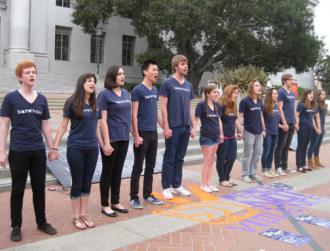reports on a Take Back the Night event at UC Berkeley that drew
survivors of sexual assault and their supporters to take a stand against
sexual violence.

Take Back the Night 2013 on the steps of Sproul Hall at UC Berkeley
THE WORDS of student organizer Diamond Raymond resonated strongly with an audience of survivors of gender violence and their allies in Upper Sproul Plaza at University of California at Berkeley: "Take back the cabs, take back the alleyways. Take back the clubs, the parties, and the walks home. Take back the night!"
Her message was clear: gender violence is everyday and everywhere. And more importantly, women, LGBTQ people and their allies are fighting back.
About 100 students and community members gathered March 14 for Take Back the Night, an annual public event that seeks to shatter silence around sexual and relationship violence through singing, spoken words, visual arts and an open mic.
Campus and community organizations including Body Peace, CalSERVE, Greeks Against Sexual Assault, the International Socialist Organization, the National Organization for Women, the Oakland Vet Center, and the Sexual Health Education Program were present to support the event.
Participants acknowledged that the global crisis of gender violence has a local manifestation. Dean of Social Welfare Jeffrey Edleson said in his speech that "women around the world, regardless of their education, regardless of the economic development of their country, face violence daily. And it's not just true in India, it's not just true in Bangladesh or Afghanistan or somewhere in Africa, it's very true here in the United States, it's very true in the Bay Area."
Someone in the U.S. is sexually assaulted every two minutes, according to the Rape, Abuse & Incest National Network.
One in three female Berkeley undergraduates at have experienced some form of sexual assault in their lifetime, according to research by the California Young Women's Collaborative and the National Asian Pacific American Women's Forum. More than half of survivors endured their most recent sexual assault during their time at Berkeley.
Additionally, Berkley city police revealed that reported rapes almost doubled from 2011 to 2012, reaching the highest number recorded in more than a decade. Most of the rapes happened in the student-age population and most involved acquaintances, friends or partners.
Allan Creighton, a social justice health educator with University Health Services explained that the actual number is certainly higher because many assaults "go unverified or unreported to any officials."
One student rape survivor shared her story during Take Back the Night open mic. She recounted being brutalized, being too scared to reach out and being suicidal. She also recounted how she was asked "why didn't you say no" and told that there was "not enough evidence" and "don't think about it and it'll be alright."
- - - - - - - - - - - - - - - -
UNFORTUNATELY, HER experience is typical.
"Society reinforces victim-blaming. We should teach people not to rape, not teach people how not to get raped" explained Ella Jane Bastone, an intern with the UC Berkeley Gender Equity Center and a lead organizer for Take Back the Night.
Angelica Tripp, a recent UC Berkeley graduate, added that "there needs to be a change in the policy around reporting rape cases because from what I hear tonight, the current policy is just reinforcing victim-blaming on the survivors. Sexual violence should be unacceptable."
Perhaps one of the sharpest critiques of sexism and victim-blaming came from one participant who said over the open mic that "if 50 percent of your population cannot even be safe walking alone at night, this is not a free country!"
Since early 2013, Berkeley students and community members have organized many public events and protests to fight sexism and gender violence.
The Hindu Students Council, Indian Students Association and the South Asian student group Indus organized a January 24 candlelight vigil for the victims of a series gang-rapes that occurred in India last December.
About 40 students participated in a February 28 silent protest against sexual torture of women by Syrian government officials. They held signs that read "He stuck a rat in her vagina" and "Sexual violence is why 1 million people have left Syria."
And on March 12 about 70 protesters marched to the downtown Berkley Police Station, where transgender woman Kayla Moore died in custody on February 12. An official investigation of the case has been painfully slow.
Berkeley students and community members are not alone. From Amherst College students' protest against sexual violence on college campuses, to a community rally against rape in San Francisco, to the mass protests against rape and sexism in India, gender
violence survivors and their allies are rising.
Many in the new generation of students and young people refuse to tolerate a capitalist social structure and state apparatus that perpetuates sexism, violence, insanity and inhumanity.
http://socialistworker.org/2013/03/20/berkeley-takes-back-the-night

No comments:
Post a Comment